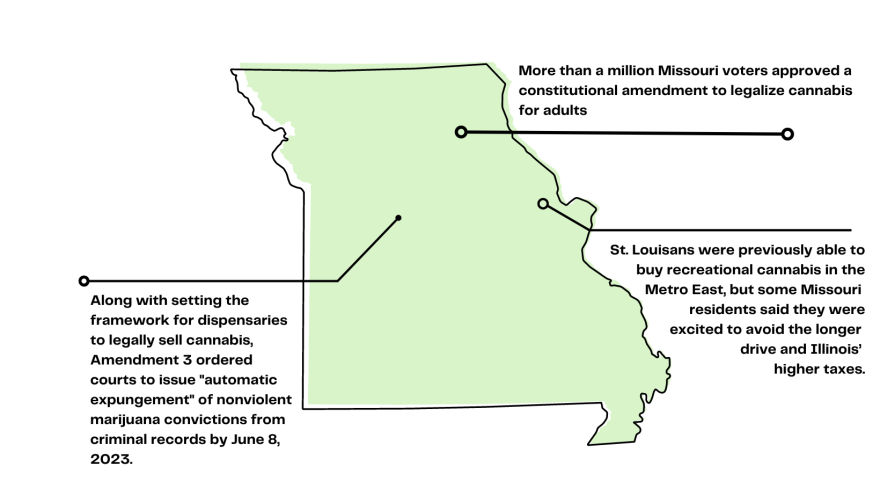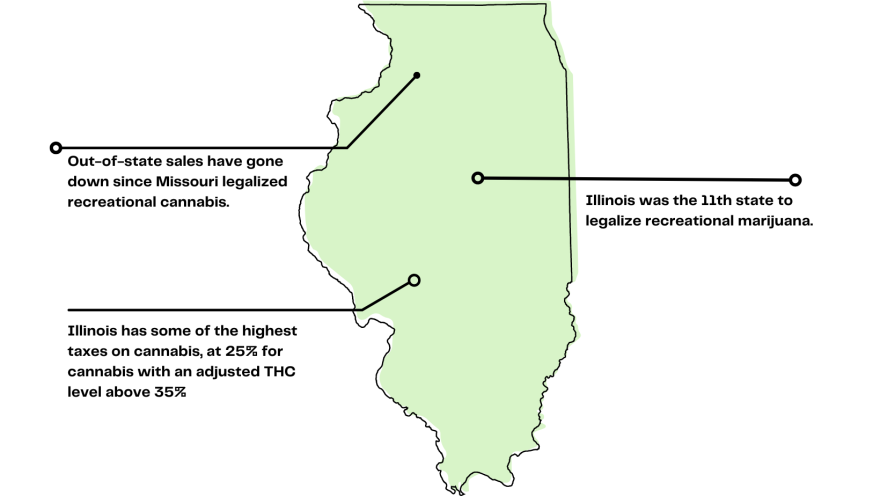Minnesota became the 23rd state in the U.S. to legalize recreational marijuana on Aug. 1.
It's the third of Iowa's neighboring states to allow residents to possess and grow marijuana. Missouri voters passed a constitutional amendment in November 2022 and the Illinois General Assembly passed legislation in 2019 to do the same.
Recreational marijuana is not legal in Iowa, and while Minnesota's the most recent state to pass legislation, not all of Iowa's neighbors are rushing to support legalization, either. Wisconsin has yet to consider medical marijuana, though a legislative committee may consider it later this year.
Nebraska lawmakers also proposed bills this year to allow for the commercial sale of recreational cannabis and to decriminalize some possessions of cannabis. A group led by lawmakers, Nebraskans for Medical Marijuana, are making their third attempt to put the question of legalizing medical marijuana on voter's ballots in November 2024. And in South Dakota, medical marijuana has been legal for a few years, and polling has shown there's a chance recreational marijuana could be legalized next year.
In the meantime, some states where marijuana is illegal, including Iowa, are still getting their high through other methods, like consumable hemp.
Minnesota easing into recent legalization
According to Minnesota Public Radio politics reporter Brian Bakst, the state “tiptoed” into the legal cannabis market.
“The THC and hemp-derived market was the first step, as maybe will be the case in Iowa,” Bakst said on IPR’s River to River. “They've been legal for about a year now — these gummies and beverages seltzers — those types of things. You can get them in a lot of places around the state, but this month was the first time that you could legally possess cannabis.”
He said it will likely be a bit longer before customers can buy cannabis in a retail setting.
The change, Bakst said, came with a shift in Minnesota’s political environment. When Democrats took control of the state legislature and the governor’s office, they prioritized marijuana legalization.
“They [said] that people are essentially using this drug anyways. They're getting it. Sometimes they're not getting a safe drug. They might get it laced with something that they weren't intending to buy -- maybe fentanyl,” Bakst said. “So they hope that this legalized regulated market will add some safety measures to the cannabis that people purchase and use that there's been a black market for a while.”

Missouri learned from other states
In Missouri, the state benefited from legalizing marijuana only after a number of other states had done it, according to politics reporter Jason Rosenbaum at St. Louis Public Radio.
Recreational marijuana was passed by a ballot measure in November 2022. It needed a simple majority vote.
“I think that we have been able to avoid some of the pitfalls of states like Illinois and others that legalized earlier, but had some issues with how the program was administered" Rosenbaum said on River to River.
Since Missouri had already legalized medical marijuana prior to legalizing it for recreational use, Rosenbaum said the transition was easy.
“I think that Missouri… already had an infrastructure in place. They already had dispensaries, they already had entities that were cultivating and manufacturing marijuana products," Rosenbaum said. "So, because of that, it was almost a little more seamless than a state that was starting from scratch.”
He says the state is still limited.
“Even though there are probably more licenses to give out than states that are more restrictive, it's still a limited market, and there are still winners and losers,” Rosenbaum said. “There's still animosity between entities that get marijuana licenses and ones that don't, because… this is a very lucrative industry.”

Illinois, home of the 'Silicon Valley of cannabis,' has profited majorly — but taxes are sky-high
In Illinois, marijuana sales bring in over $1 billion in annual revenue, according to cannabis reporter Robert McCoppin with the Chicago Tribune. Cannabis taxes in the state are the highest in the nation — up to 25%.
Faced with little competition, three of the biggest marijuana-producing companies in the country have established themselves in Chicago and expanded into other states. Illinois' sales from out-of-state customers — which total a third of all marijuana sales — have taken a slight hit since Missouri legalized recreational marijuana, with lower taxes.
Smoking remains illegal in public and is only allowed for those 21 and older.

Other states turning to consumable hemp
Iowa’s consumable hemp program, regulated by Iowa Department of Health and Human Services, has allowed registered retailers and producers to sell non-inhalable products that contain 0.3% or less total THC, or tetrahydrocannabinol, the principal psychoactive component of cannabis. It was created after hemp was legalized in the 2018 Farm Bill, which has opened doors in other states where recreational marijuana is illegal as well, such as Iowa's neighbor South Dakota.
River Bluff, an east Dubuque company which also owns a cannabis dispensary in Roselle, a suburb of Chicago, is one of the businesses profiting off the program.
Co-owner Ali Gansemer says the company seeks to reduce the stigma around cannabis use.
She says hemp impacts the body in a similar way to THC as it's a different species of cannabis plant. The company works with local hemp farmers to secure hemp oil to make their products in compliance with Iowa law.
She said she finds Iowa’s hemp program very well outlined, so businesses can easily interpret the law and how to produce their products legally.
“So for example, they've been very clear there's no hemp consumable inhalable product,” she said on River to River. “We're on the flip side of that, when it comes to edibles and things like drinks or topicals. They're just very clear on what type of dosage you can have, and even what the labels should look like and what needs to be on those labels.”
She says low-dose cannabis drinks are going to be “the next biggest thing” on the market.
“For those individuals that feel like to be social, but maybe want to move away from alcohol, there should be a new product line that can help them,” she said. “So again, we've taken the laws of Iowa, because these are some of the strictest we've seen, but some of the most clear that we've seen, and we've arranged our product categories to fit within that scope. So it's actually helped us as a business to move forward in a much more clear path.”
She says she sees more support from Iowans being the key to change.
“The more groups that are advocating for how cannabis is truly changing individuals’ lives, the more support we should be receiving, and we can expect to receive as others go out and advocate on behalf of the products as well.”





